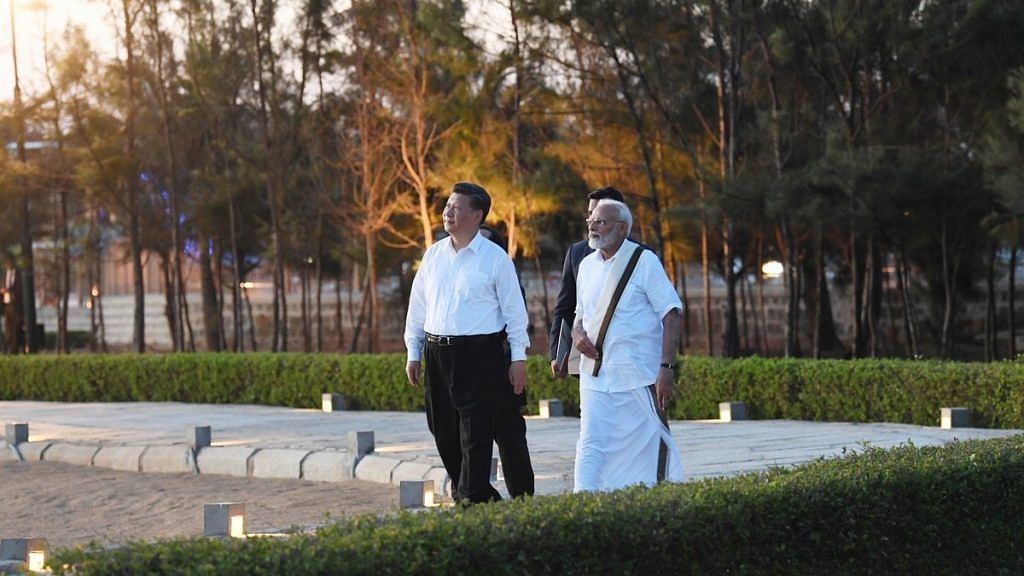New Delhi: India is thinking of ‘discontinuing’ informal summits between Prime Minister Narendra Modi and Chinese President Xi Jinping after the Galwan Valley clash between the two armies on 15 June that killed 20 Indian and an undisclosed number of Chinese soldiers, ThePrint has learnt.
The countries are currently working on a process of disengagement from the violent border stand-off.
While New Delhi and Beijing had been cooperating with each other through the Covid-19 lockdown, sending each other medical supplies and other items, Modi and Xi did not once speak to each other, even though the Indian PM had telephonic conversations with most world leaders, multiple times with the US President Donald Trump.
Sources said the practice of holding “informal” meetings between India and China began in 2018 post the Doklam stand-off, in order to have a “better understanding” of each other’s position on outstanding boundary questions, without any formal processes being followed.
The first of these took place in Wuhan in April 2018, and was largely seen as an attempt by both sides to thaw a relationship that went into deep freeze due to the 73-day face-off on the Doklam plateau near India-Bhutan-China tri-junction. However, plans to organise an informal summit began prior to the Doklam stand-off.
Sources said this time, India is “compelled” to take a decision on whether to continue with the summits, since this is the first time since 1975 that it has lost soldiers in a border skirmish with China.
Also read: 1975 Arunachal ambush — the last time Indian soldiers died in clash with China at LAC
The first two summits
At the first informal summit in Wuhan, on the issue of the boundary, Modi and Xi agreed to direct their militaries to “to earnestly implement various confidence building measures agreed upon between the two sides, including the principle of mutual and equal security, and strengthen existing institutional arrangements and information sharing mechanisms to prevent incidents in border regions,” according to the joint statement issued.
Then, at the second summit in Mamallapuram near Chennai in October 2019, Modi and Xi took the decision to direct their Special Representatives — National Security Advisor Ajit Doval and Chinese Foreign Minister and State Councillor Wang Yi — to arrive at a “mutually-agreed framework for a fair, reasonable and mutually acceptable settlement” that will be based on the 2005 agreement on ‘Political Parameters and Guiding Principles’.
“The informal summits do have their advantages in enabling the leaders to have an exchange of views, derive benefit from each other’s experiences, and convey their concerns to each other,” said S.L. Narasimhan, member of the National Security Advisory Board and distinguished fellow at the Centre for Air Power Studies.
“The border issue is just one aspect of the multifaceted bilateral relationship. Continuing the informal summits is a call that the government may take after considering all factors,” he said.
Also read: India, China look to build on Doval-Wang dialogue, eye ‘long-term settlement plan’ for LAC
No progress on economic issues
The reality is there has been significant deterioration in the already strained relationship between New Delhi and Beijing, both militarily as well as economically, instead of an improvement in the bilateral ties.
A month after the second informal summit in Tamil Nadu, PM Modi decided to stay out of the Regional Comprehensive Economic Partnership (RCEP) pact, blaming the Chinese for refusing to pay heed to India’s demands on goods and market access.
According to sources, China did not “relax” the terms of the agreements in terms tariff liberalisation for India.
This decision came despite the fact that in Mamallapuram, the two sides had agreed to establish a high-level dialogue on trade and economic matters.
While other participants of the RCEP such as Australia, Japan and the 10-member ASEAN have been urging India to join the pact, India has said the chapter is closed as it focusses on Modi’s call for an ‘aatmanirbhar bharat’ or self-reliant India.
Experts, however, have repeatedly questioned India’s refusal to join the RCEP and putting restrictions on inflow of Chinese capital, saying that jeopardises India’s engagement with the ASEAN countries, which are also party to the trading arrangement.
In April this year, with an aim to check capital flowing in from China, the Indian government had put restrictions on foreign direct investment from neighbouring countries. India believes such a decision was important as Chinese companies were using market forces of democratic countries to acquire companies through hostile takeovers.
According to former foreign secretary Shyam Saran: “There seems to be an assumption in India that you can substitute your economic presence in the region by a greater security profile. I am afraid it does not work that way. Both are absolutely essential pillars in terms of how you deal with the region.”
Saran, who was speaking at a webinar on ‘India’s Economic Engagement in Asia: How should it change after Ladakh?’, organised by the Centre for Policy Research (CPR) Wednesday, also said that despite India’s best efforts, the ASEAN countries, as well as Japan and South Korea, will come under China’s dominance, and thus, New Delhi needs to engage with them more robustly.
Aatmanirbhar Bharat is not going to be a strategy that will make India an export-oriented economy, enabling greater trading ties with these countries, he said.
Also read: Modi reviving NAM won’t be enough in post-Covid world. India must reconsider joining RCEP
